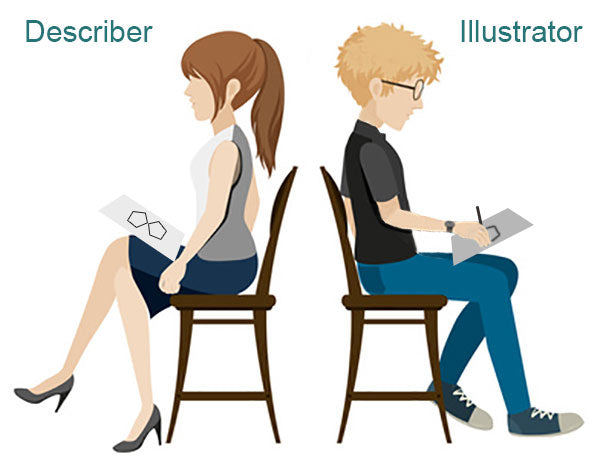Purpose
This is an energizing exercise designed to show the difference between direct instructions and feedback. In other words, it shows that shaping seems to be a lot more effective than telling.
Objective
An instructor and a group compete with two different styles of communication to guide a volunteer to do a task.
Setup
- Ask the delegates for two volunteers. One will be the Instructor and the other will be the performer.
- Ask the performer to leave the room until you come and ask for them.
- Ask the delegates to select a behaviour for the performer to perform. For example this can be placing hands in a certain configuration.
- Tell the instructor to give instructions to the performer to move their legs to a particular configuration.
- Now ask the performer to come back to the room. Explain that the performer should listen to the instructor and the audience.
- Start the exercise. The instructor should instruct the performer to move their legs.
- The rest of the audience should shout ‘Yes’ every time the hands move closer to the target configuration. Effectively, the performer might listen to the instructor to move their legs which may then move their hands at which point he may get a ‘Yes’ from the audience.
- The instructor can then use stronger and more direct words to get the performer to move their legs while the audience may respond back accordingly.
- Let their go for a while until the performer finds the target configuration and then follow this with a discussion. Otherwise stop the exercise after 10 minutes.
Timing
Explaining the Test: 5 minutes.
Activity: 15 minutes
Group Feedback: 10 minutes.
Discussion
As you can imagine, this game can be quite entertaining and tense. It certainly produces a lot of laugher so it is great to soften the mood.
The performer will usually figure out that the responses are diverging and usually will go with the audience. The exercise shows that despite strong counter instructions, it is easy to get clues from a feedback and get closer to a goal.
Ask the delegates what they thought of this exercise and ask them the following questions:
- Which one wins, instructions (telling) or feedback (shaping)?
- Do you have any examples form work that demonstrates the power of feedback over instructions?
- Is it good for a supervisor only to tell what should be done? What happens if feedback is missing?
- How motivated will you feel when you receive feedback as opposed to direct telling instructions?
- Can you provide examples of telling that have not worked in the past, but that you can easily see that giving feedback could have been more effective?
Comments
By Oscar Becerra @ Sunday, May 23, 2010 12:47 AM
I think this is a great exercise, will try it in my next class and post more feedback. Thank you very much
Soft Skills Training Materials
Get downloadable training materials
Online Train the Trainer Course:
Core Skills
Learn How to Become the Best Trainer in Your Field
All Tags
Training Resources for You

Course Design Strategy
Available as paperback and ebook

Free Training Resources
Download a free comprehensive training package including training guidelines, soft skills training activities, assessment forms and useful training resources that you can use to enhance your courses.

Our Comprehensive Guide to Body Language

Train the Trainer Resources
Get Insights - Read Guides and Books - Attend Courses
Training Materials
Get downloadable training materials on: Management Training, Personal Development, Interpersonal Development, Human Resources, and Sales & Marketing














Leave a comment
All comments are moderated before being published.
This site is protected by hCaptcha and the hCaptcha Privacy Policy and Terms of Service apply.